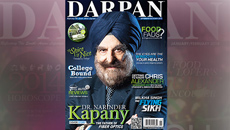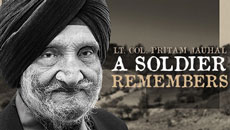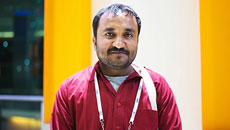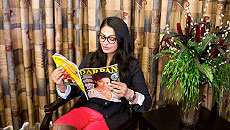Ajay V. Bhatt, is known for his contributions to the world of technology in the form of his co-invention, the USB (Universal Serial Bus). Currently holding 32 patents in the area of Platform architecture, Bhatt has stamped a profound impact in the world of technology and is working towards making the technology more user-friendly.
Can you tell us a bit about your history?
I was born in Bangalore. My mother was from Bangalore and my father grew up in Gujarat. He was a professor in a university in a city called Baroda. So I grew up in Baroda, also known as Varodara. My wife was born in Uganda and I met her while I was in Boston at the Indian festival Garba and eventually we got married. We have been married for 31 years now.
Did you always want to be an engineer?
My dad was an artist, a musician and I was surrounded by people who were liberal arts majors. I am the only engineer in the family and from a very young age I was the one who would fix things in the house. I was always curious. My inclination was always math, physics, science. So from a very young age I liked fixing things and that led to a career.
Can you tell me about your journey from the time you left India to the point of becoming a USB co-inventor and holding several patents?
I left India to pursue graduate studies because when I graduated there was not much you could do in terms of computer science. I joined City University of New York because I used to have a text book by a professor who was at the City University of New York and I ended up being a research assistant for him on a project that we worked on. In the summer of 1982, I got summer training in a company in Boston and eventually I ended up joining them to design graphics workstations for printing and then subsequently after finishing that project I was hired to do mini computers and workstations at Wang Laboratories, it doesn't exist anymore but I was there for about seven years. Eventually I got hired by Intel and I joined there as a senior engineer. The whole notion of personal computers was that we are going to take them beyond just the businesses to individual users. At that time not a lot of people used personal computers at home and I saw one of the biggest shortcomings in computers because they were very difficult to use. Even if you wanted to connect a printer it was a tough task. That is where I started thinking about a way to connect the computer that was as easy as plugging your toaster in your AC outlet and that eventually became the USB.
How did your peers react when you shared the idea of inventing the USB?
Most of the people did not quite understand what this was all about, including my then supervisor. But then I was able to find a few like minded people throughout the company and eventually we got together pulled together a proposal and convinced management that this was something worth pursuing and this was going to really address on the pain points that an average user would have.
You collaborated with Compaq, DEC, IBM, Intel, Microsoft, NEC and Nortel to deliver the USB. What was your vision in inviting these companies on such a project?
We did a lot of work at Intel before we even went out. Before we went out, our proposal was very much complete so the major things that you see in the USB were decided by then in the form of proposal. However with things of this nature where many manufacturers would use that technology in their own applications, we felt that it was important to be inclusive and made the USB much bigger than just attaching the printer or keyboard or a mouse. We had this grand vision of having a very ubiquitous interconnect or interface to the computer and hence we actually went out and pitched our ideas. We offered to partner with everybody and anybody that was willing to work with us at that point. These companies were the ones that showed interest and they made some investments in improving our proposal, providing useful feedback and becoming co-developers of this specification
Would you say that the USB is your biggest achievement?
That is one that is most known to an average person. I have had other inventions that have had much bigger impact to the computers. They are all inside the computer, so an average user doesn't really know about those things. In terms of the computer, my other inventions have been as successful as the USB but by far the USB is the most known and probably most used by an average user in their day to day work. I must say that all these things that I worked on and developed, I have enjoyed great partnership from colleagues at Intel in an industry so I can't really take all the credit that is attributed to me. I truly believe in team work and I think a lot of people have contributed to this.
You are working on a computer that will work all day. Can you tell us more about that?
Starting from the phones to computers, energy efficiency is very important and we have been looking at architectural enhancements to the computer that would give you performance when you need it but will then go to sleep and conserve the battery. What it does is it results in great battery life savings. One of the other things in making computers more user-friendly is to make them thin and light. When you make computers thin and light, their batteries also have to be light. So we have been making computers thinner, energy efficient and making them run a lot cooler. All the issues are interconnected and that is where my colleagues and I at Intel have been working on.
What are your interests?
I am very passionate about photography. I like to go out and shoot pictures whenever I get the opportunity and also improve my skills. Every opportunity that I get I can pair photography with my other interest and that is travel. I travel extensively for my work as well as for my own interests and every time I go on a trip to an exotic place my camera always goes with me.
What do you see the future of USB as?
USB, just as we speak, is improving. We recently announced a new specification. One of the major pain points of the USB is plugging it correctly, but now you wouldn't have to think about which end is up or which end is down. Next year's computers and beyond, will have this new version of USB, it is going to go significantly faster than the latest version of USB. Today you can charge your phone with USB, as we go forward you should be able to charge your laptop. I can see the USB continuing for the next decade or two.
What current projects are you working on?
I am always working on some new things. I have done a lot of work on this new USB that will be out soon. We are just concluding and working towards the productization of that. I am working on an exciting touch technology. This touch technology for bigger screens I hope will revolutionize the way we interact with computers.





